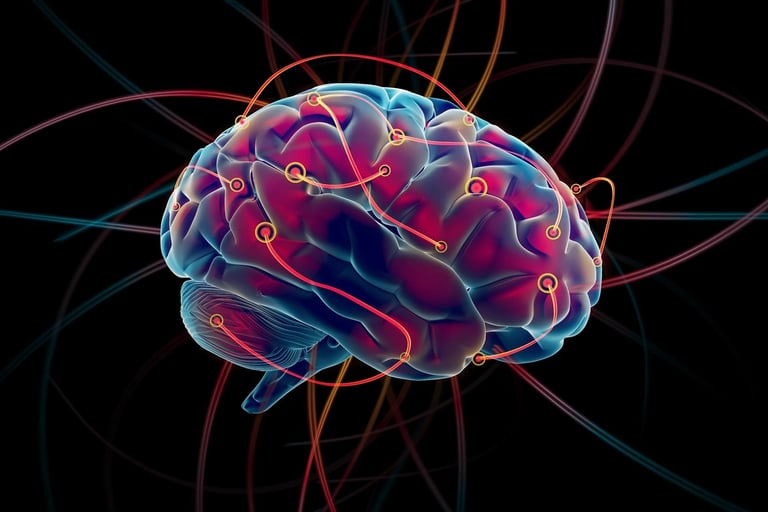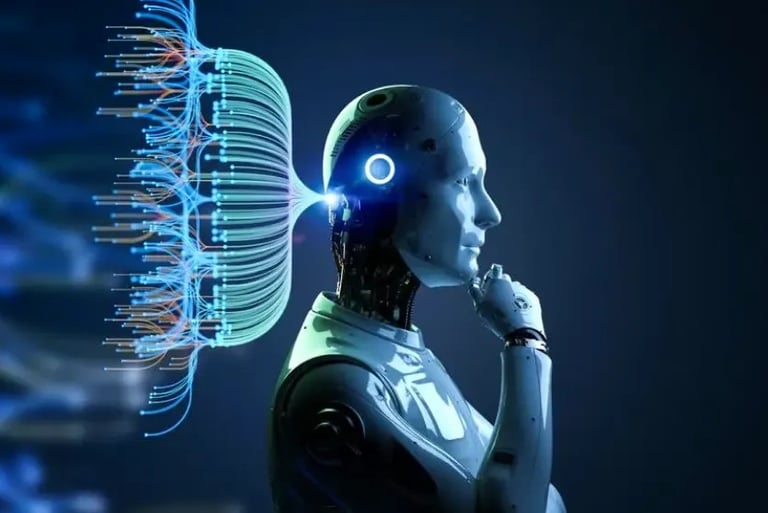Cognitive AI is Changing Human Memory (Just Like Google Did)
MemoryMatters #45


Cognitive artificial intelligence changes the way our brains store and process information. People check their phones ~85 times each day. This behavior has led experts to identify a condition called "digital dementia" - where people suffer memory loss and can't focus well. Sometimes this memory loss is searched for on purpose - for example having a day where we want to drown out our thoughts with Digi-overload. For other times it can be a result of over exposure. Our relationship with human memory keeps changing as research shows that improper AI tools use could affect thinking critically.
We've seen this before. Just as Google changed how we look things up, today and more in the future we now hand over large quantities of our thinking to AI systems. Cognitive AI works differently from regular systems because it copies how humans think while it reshapes our thought processes. Studies show that people who constantly switch between different media have less gray matter in parts of their brain that control thinking. As we traverse this new AI world it is important to treat all this input as tools to still maintain a critical mind.
As we learn through this article Lets be clear, im also a digi-nut and an avid user so there is no judgment from me over this article - Lets Learn Together.
Cognitive AI and Human Memory
"By far, the greatest danger of Artificial Intelligence is that people conclude too early that they understand it." — Eliezer Yudkowsky, AI researcher and co-founder of the Machine Intelligence Research Institute
Memory acts as both the foundation of human intelligence and advanced artificial systems. Scientists have found striking similarities between how our brains work and how machine learning is built. The line between cognitive science and artificial intelligence gets thinner each day.
Cognitive vs Traditional AI
Cognitive artificial intelligence marks a major step forward from conventional AI systems. Traditional AI runs on preset algorithms and rule-based programming. While artificial intelligence performs exceptionally well on defined, structured tasks, it tends to falter when confronted with ambiguity. Systems classified as cognitive AI are specifically engineered to replicate human mental functions including logical reasoning, solution development, and contextual comprehension.
These approaches differ in several key ways:
Adaptability: Traditional AI needs frequent retraining with structured data. Cognitive AI learns and adapts to new information without much reprogramming potentially training on its own data set in the future.
Data Processing: Old systems mainly work with structured, labeled datasets. Cognitive AI handles both structured and unstructured information well.
Decision-making: Traditional AI follows preset rules and logic. Cognitive AI thinks about context and comes up with smart responses instead of just following orders.
Human Interaction: Cognitive systems understand natural language and context nuances. This makes them much better at talking to humans.
Cognitive AI doesn't just do tasks—it wants to boost human intelligence. It offers reasoning and context analysis that helps us make smarter choices. This marks a big change from simple task-based programming to smart systems that think like humans.
The role of memory in cognitive science and artificial intelligence
Memory plays a vital part in how humans and AI systems work. Scientists now focus on understanding memory to push AI forward. Recent findings show amazing similarities between how AI processes memory and how the human hippocampus works, especially in turning short-term memories into long-term ones.
AI systems, just like humans, use two main types of memory: short-term working memory and long-term memory. Short-term memory works like a mental desk where quick data handling happens. Chatbots use it to keep track of conversations and give relevant answers. Long-term memory stores knowledge and past experiences, which helps spot patterns and make predictions. Recently OpenAI rolled out their ability to keep your conversations in context expanding on its memory usage.
A breakthrough study showed that the Transformer model—the life-blood of AI progress—uses a gatekeeper much like the brain's NMDA receptor, which helps form memories. Scientists also found that long-term memory in AI models can be improved by mimicking this receptor. This suggests brain science can make machine learning better.
Why memory is central to human cognition
Memory shapes every part of how we think. It does more than just store information—it lets us learn from experience, spot patterns, and predict what might happen next. These skills help us navigate our complex world.
Our brains handle memory in clear stages: they gather information, encode it for storage, organize and store it, then pull it back when needed. This complex process needs neurons, neurotransmitters, and many brain regions to work together.
Memories mainly form in the hippocampus in our temporal lobes, but other brain parts help too. The prefrontal cortex handles short-term memory, while long-term memory uses the basal ganglia, cerebellum, neocortex, striatum, and amygdala.
Memory does more than just help us remember things. New research using AI models shows how memories help us learn about the world, relive past experiences, and imagine new scenarios. These models reveal that when we rest and replay memories, our brains find patterns that help us make life-saving predictions.
Rise of Cognitive Offloading in the Digital Age
Image Source: Sunny Singh - Medium
People have always created clever ways to store information outside their brains. Cave paintings and written language show our early attempts. The digital world has changed everything about how we handle what we know and remember.
Google changed our memory habits
The "Google Effect" emerged from research in 2011. Scientists found that people don't try hard to remember things they can easily find online. We just remember where to look up facts instead of storing them in our minds. When i was a kid i would have to remember all my friends phone numbers in addition to family members before i put that 25 cents into the payphone. Today its a challenge to remember my local families numbers because i know i can simply look them up - potential mental optimization strategies were formed.
This shows a basic change in how human memory works. Before the internet was everywhere, humans had to remember important information. Now we reach for our phones the moment we need answers. Studies show that people who know they can find information later don't remember the facts as well. They do however know how to regain the lost information.
Research backs this up. People who look things up online finish tasks faster than those using books but may not remember the actual information as well. A study that lasted six days revealed something concerning. People who searched the internet showed reduced regional homogeneity and functional connectivity in brain areas that handle memory. I still love my google search to gain some quick knowledge needed.
Transactive Memory Systems
Psychologist Daniel Wegner introduced transactive memory in 1985. This idea explains how groups work together to remember things. Studies of couples and families showed these groups could remember more together than any one person could alone.
The old way of transactive memory meant people counted on each other's special knowledge. They remembered who knew what instead of trying to know everything. To name just one example, one spouse might track important dates while the other remembers house maintenance. This needs:
Knowledge of what others know best
Faith in other people's information
Good communication between everyone
The internet has completely changed this idea. Unlike traditional memory sharing, the internet works differently in two big ways. Users don't need to keep special information for others. Everything factual comes from one source. We just need to remember it's somewhere "online".
AI Tools Are Reshaping Memory Functions
AI tools are changing how our brains process and store information. This change goes way beyond simple convenience. These tools are rewiring our cognitive architecture in ways scientists are just starting to grasp.
The 'Google Effect' and its rise
Referring to “The Google Effect”, people started forgetting things they knew they could find online. This effect has grown much stronger with cognitive AI.
Modern AI tools guess what you need and offer information before you ask. Search engines need you to look things up yourself. Research shows this new approach involves even less brain work than regular searches. Studies from 2021 reveal that "when people see how to reliably access new information using Google, they become less likely to store that information in their own memory".
Memory Delegation
Conversational AI agents take memory delegation to new levels through their human-like interactions. These chatbots create natural conversations unlike search engines. This leads to unique effects on how we think. Quick, friendly chats with AI help develop user trust and can affect our thinking in new ways. This subtle shift makes us comfortable handing over:
Problem-solving abilities
Emotional processing
Creative ideation tasks
Decision-making processes
A participant in a 2023 study said, "I find myself using AI tools for almost everything—whether it's finding a restaurant or making a quick decision at work. It saves time, but I do wonder if I'm losing my ability to think things through as thoroughly as I used to". Modern AI's friendly, accessible interface makes us surprisingly ready to give up thinking tasks that used to be uniquely human.
Decision-Making in the Age of AI
Image Source: Orient Software
"It is not enough for machines to be intelligent; we must ensure they are aligned with human values." — Stuart Russell, Computer scientist and AI researcher at UC Berkeley
AI's relationship with human cognition goes far beyond just affecting our memory. Our critical thinking faces new challenges as we hand over complex thinking tasks to AI systems more often.
The risk of cognitive laziness
Scientists have discovered a new trend—"metacognitive laziness"—where people hand over their thinking responsibilities to AI tools instead of engaging deeply with tasks. Age plays a key role here. Young people (aged 17–25) show more AI dependence and lower critical thinking scores than older groups. One young participant openly shared, "I rarely reflect on the biases behind the AI recommendations; I tend to trust them outright".
These changes affect both individuals and organizations. Companies have increased their use of AI in strategic decisions from 10% to 80% over the last five years. This shift might reduce human abilities like intuitive analysis and creative problem-solving—and as they say, "use it or lose it."
This trend of offloading our thinking to machines brings up a basic challenge: how do we use AI's benefits while keeping the critical thinking skills that make us human?
Age-Based Differences in AI Dependence
Age differences in AI dependency show the sort of thing I love about how we outsource our memory functions. People's interaction with cognitive artificial intelligence changes based on their age. These changes affect memory retention, learning, and cognitive development.
Young technology professionals (ages 18-25) are happy to accept new ideas about AI tools. Their weekly adoption rate reaches approximately 75%. This rate drops steadily with age. Children who grow up with AI show even deeper integration. Studies reveal young children (ages 3-6) often think smart speakers have human-like qualities. They believe these devices possess thoughts, feelings, and social abilities.
Children trust AI more than humans, especially about facts. This early dependency creates some concerns. Younger participants openly admit their reliance: "I sometimes worry that I'm not really learning or retaining anything.".
People aged 46 and above show substantially lower AI dependency. They consider this resistance carefully. Older adults often prefer traditional problem-solving methods. They believe these approaches help maintain their cognitive abilities. Its the 'Old-School’ way i suppose.
Balancing AI Use with Cognitive Engagement
The balance between AI assistance and independent thinking represents a major challenge today. Studies show a strong negative relationship between AI usage and critical thinking (r = -0.68, p < 0.001). The “r = –0.68” number tells us there’s a strong link and that it goes in opposite directions (more AI use, less critical thinking). And “p < 0.001” means the result is extremely unlikely to be just a random fluke—so we can be very confident this pattern is real. We need strategies to protect our mental capabilities.
Strategies to reduce overreliance
Effective cognitive balance needs well-thought-out practices. Digital detoxing helps reduce cognitive overload and stress levels. Tech-free periods or spaces allow independent thinking. Monitoring screen time with tracking apps helps balance usage patterns and preserves cognitive function.
Thoughtful design in AI systems can discourage overreliance. Simple explanations help users think critically about content. To cite an instance, users examine AI recommendations more carefully when explanations are simpler than the task itself. Being open about AI's limitations helps maintain healthy skepticism. Real-time feedback can warn users about potential overreliance. We used cognitive forcing functions—steps that make users think critically before accepting recommendations.
Closure Report
Cognitive artificial intelligence is one of the biggest changes in how we interact with technology and handle information. AI accelerates the cognitive offloading trend that started with search engines. The strong negative link between AI tool usage and critical thinking skills (r = -0.68) warns us about the risks of over-dependence on these systems. Digital dementia affects different age groups in various ways. Young users are more likely to experience memory loss and cognitive outsourcing, while older adults often maintain their cognitive strength by being cautious before fully adopting AI. Setting healthy boundaries with these technologies helps preserve cognitive function for people of all ages.
AI systems mimic human thought processes accurately but lack the deep understanding and life experience unique to humans. Thus, we should see AI as a helper, not a replacement. The link between human memory and AI reveals limitations and opportunities. Research shows that understanding biological memory can enhance AI, while computer models can clarify human thinking. Striking a balance is challenging when these tools provide quick, human-like responses. We must harness cognitive AI's abilities while maintaining our critical thinking skills. Our relationship with memory evolves, but analyzing, relating to, and creating meaning from information should remain our responsibility, not that of our digital assistants.
CTA - As engineers and architects shaping the future of AI and human-computer interaction, how are you balancing the powerful cognitive benefits of AI with the need to preserve and enhance human critical thinking and memory? What design principles or strategies do you believe are essential to prevent cognitive offloading from undermining our mental capabilities?
Linked to ObjectiveMind.ai




